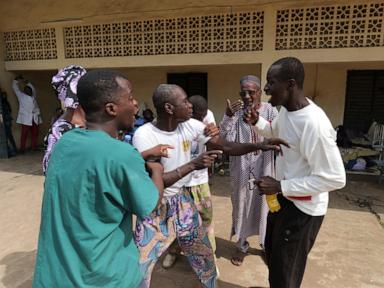BAMAKO, Mali -- In the courtyard of a psychiatric ward in Mali’s capital, a small group of patients acts out scenes of a village dispute to the beat of a djembe, a traditional West African drum. One patient, Mamadou Diarra, cries out to another in the Bambara language, mocking: “You don’t know anything! Just nonsense!” But both break into smiles, and Diarra dances as he continues launching insults at his fellow performer. The group is taking part in koteba, a traditional form of theater practiced by Mali's largest ethnic group, the Bambara.
It mixes acting, singing and dancing and is usually performed in villages as an outlet to work through problems and an open space for satire. But here at Point G, one of the largest hospitals in Bamako, koteba is also a way of offering support and a sense of community to people receiving psychiatric care. Mali has fewer than 50 mental health professionals for a population of more than 20 million, according to a 2022 report by the World Health Organization.
People with mental illnesses are often left without treatment and excluded from society. Though the use of koteba as therapy hasn't been formally studied, Souleymane Coulibaly, a clinical psychologist at the Point G hospital, said the traditional form of theater is uniquely positioned to help people in the psychiatric ward work through their problems. “Patients who attend koteba leave the hospital more quickly than those who refuse to attend the theater session,” he said.
In .


















